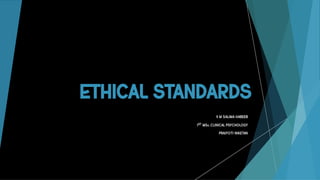In 3 sentences:
The document discusses the American Psychological Association's Ethical Standards which consist of an introduction, preamble, and principles to provide guidelines for psychologists. The standards address issues like competence, relationships, privacy, and provide rules for advertising and research. Any psychologist who is an APA member is expected to adhere to these ethical standards, and violations can result in sanctions.
















